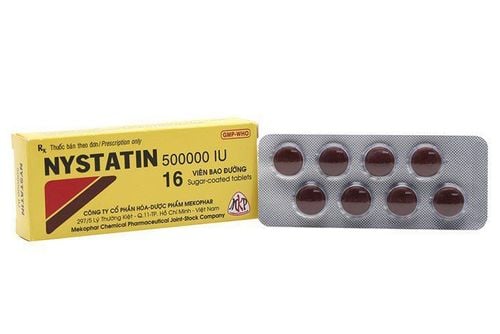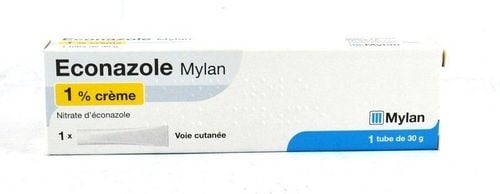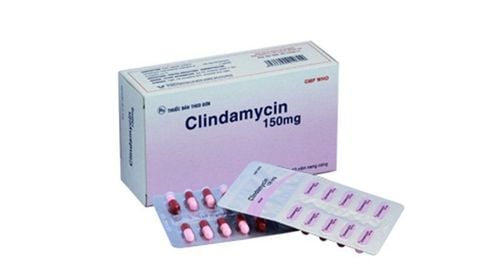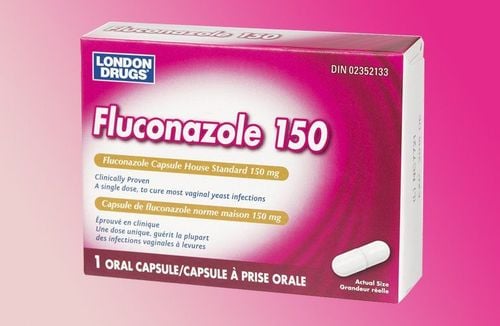This is an automatically translated article.
Voriconazole is a triazole antifungal medicine used to treat serious fungal infections, which are common in immunocompromised patients. These include invasive candidiasis, invasive aspergillosis, and new fungal infections.
1. Uses of the drug Voriconazole
Voriconazole is indicated in adults and children 2 years of age and older for the treatment of serious fungal infections such as invasive aspergillosis (a fungal infection that begins in the lungs and spreads through the bloodstream to other organs). , candidiasis of the esophagus (which can cause white patches in the mouth and throat), and candidiasis in the bloodstream. It is also used to treat fungal infections when other medicines have not worked for certain patients.2. How to take Voriconazole
Voriconazole is available as tablets and suspension (liquid) for oral administration, the drug should not be taken with food (at least 1 hour before or 1 hour after a meal).
If you are taking voriconazole suspension, shake the bottle for about 10 seconds before each use to mix the medicine well. Do not mix this suspension with any other medication, water or any other liquid.
The length of treatment depends on your general health, the type of fungal infection you have, and how well you respond to the medication.
3. Voriconazole side effects
Voriconazole may cause some unwanted effects. Tell your doctor if any of these symptoms are severe or do not go away: unusual vision, trouble seeing colors, diarrhea, nausea, vomiting, headache, dizziness, dry mouth, flushing .
Tell your doctor right away if you have any serious side effects, including: vision changes (such as blurred vision, change in color vision), sensitivity of the eyes to light (photophobia) light), eye pain, signs of kidney problems (such as change in the amount of urine), bone and joint pain, mental changes (hallucinations), swelling of the hands, ankles, feet , the skin easily bruises, bleeds.

Voriconazole có thể gây ra tác dụng không mong muốn như thị lực bất thường
4. Be careful when using Voriconazole
Tell your doctor if you are allergic to voriconazole, other antifungal medicines such as fluconazole, itraconazole or ketoconazole; or any other medicine.
Do not take voriconazole with any of the following medicines: carbamazepine ; cisapride; efavirenz; ergot drugs such as dihydroergotamine, ergoloid mesylates, ergotamine, and methylergonovine; naloxegol; phenobarbital ; pimosite; quinidine; rifabutin; rifampin; ritonavir ; sirolimus; St. John's wort; and tolvaptan.
Tell your doctor if you have ever been treated with chemotherapy drugs for cancer and if you have had or are suffering from a prolonged QT interval (a rare heart problem that can cause irregular heartbeat). irregular heartbeat, fainting, or sudden death), or if you have or have ever had a slow or irregular heartbeat, low blood electrolyte levels, cardiomyopathy (an enlarged or thickened heart muscle that stops the heart from pumping blood normally), blood cell cancer, galactose intolerance or glucose-galactose malabsorption (an inherited condition in which the body cannot tolerate lactose); any condition that makes it hard for you to digest sucrose or lactose (found in dairy products), or liver or kidney disease.
Inform your doctor if you are pregnant, plan to become pregnant or are breast-feeding. You should not become pregnant while taking voriconazole because voriconazole can harm an unborn baby.
If you are having surgery, including dental surgery, tell the doctor or dentist that you are taking voriconazole.
Voriconazole can cause vision problems and may make your eyes sensitive to bright light. Voriconazole can make your skin sensitive to the sun so plan to avoid prolonged or unnecessary exposure to sunlight and wear protective clothing, sunglasses and sunscreen when going outside. .
5. Drug interactions
Voriconazole can slow the elimination of other medicines from your body, which could affect how well they work. Affected drugs include eletriptan, ergot alkaloids (dihydroergotamine, ergotamine), drugs for irregular heartbeats (disopyramide, dronedarone, quinidine), lurasidone, pimozide, ranolazine, sirolimus, statins (e.g., cholesterol medications) such as lovastatin, simvastatin).
Other drugs may affect the elimination of voriconazole from your body, which may affect how voriconazole works. Examples include efavirenz, mitotane, rifamycins (such as rifabutin, rifampin), ritonavir, certain seizure medications (such as carbamazepine, phenobarbital), St. John's wort.
Knowing information about Voriconazole before use always brings positive effects as well as limits risks for patients. If you have any questions, you can send them to Vinmec International General Hospital to receive in-depth advice from a team of doctors and pharmacists with many years of experience.
Please dial HOTLINE for more information or register for an appointment HERE. Download MyVinmec app to make appointments faster and to manage your bookings easily.
Reference source: webmd.com













